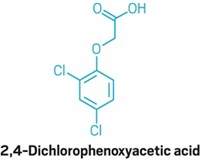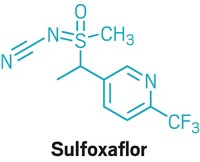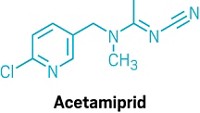Advertisement
Grab your lab coat. Let's get started
Welcome!
Welcome!
Create an account below to get 6 C&EN articles per month, receive newsletters and more - all free.
It seems this is your first time logging in online. Please enter the following information to continue.
As an ACS member you automatically get access to this site. All we need is few more details to create your reading experience.
Not you? Sign in with a different account.
Not you? Sign in with a different account.
ERROR 1
ERROR 1
ERROR 2
ERROR 2
ERROR 2
ERROR 2
ERROR 2
Password and Confirm password must match.
If you have an ACS member number, please enter it here so we can link this account to your membership. (optional)
ERROR 2
ACS values your privacy. By submitting your information, you are gaining access to C&EN and subscribing to our weekly newsletter. We use the information you provide to make your reading experience better, and we will never sell your data to third party members.
Pesticides
Groups pressure US EPA to act on pesticide-coated seeds
Lawsuit asks a federal court to order the agency to respond to a 2017 petition
by Britt E. Erickson
December 20, 2021
Nearly five years after environmental groups and beekeepers petitioned the US Environmental Protection Agency to end exemptions for pesticide-treated seeds under the federal pesticide law, the agency is facing another lawsuit for not responding.

The Center for Food Safety, Pesticide Action Network (PAN) North America, and other advocacy groups first petitioned the EPA in 2017 to stop allowing seeds coated with neonicotinoids and other systemic pesticides to sidestep pesticide registration and labeling requirements. The agency considers pesticide-coated seeds “treated articles,” which are exempt from regulations.
The plaintiffs argue that “coated seeds are not treated primarily to protect the seed itself, but rather to protect the growing plant.” As a result, the groups say they should not be considered treated articles.

The EPA has yet to respond to the 2017 petition. In a Dec. 14 lawsuit, the groups ask a federal court to order the EPA to respond to the petition by a court-ordered deadline.
In the interim, seeds coated with systemic pesticides, which get taken up by growing plants and distributed throughout plant tissues, are causing irreparable environmental harm, the plaintiffs say. Corn, soybeans, and sunflowers, among other crops, are often grown from seeds treated with neonicotinoids. These chemicals protect growing plants from insect pests, but they can also harm beneficial insects, pollinators, and birds. Neonicotinoid-coated seeds are responsible for mass die-offs of honey bees and native bees, the plaintiffs claim.
They also point out that about 95% of pesticides applied to seeds do not remain on the seeds. A large amount comes off as dust during planting, the groups say, contaminating the surrounding air, soil, and water.
“The vast majority of acres planted in crops such as corn, soybean, and cotton are planted with pesticide-treated seeds, yet farmers know less about pesticides applied to their seeds than pesticides applied in other ways,” PAN senior scientist Margaret Reeves says in a statement. “EPA must regulate this use and mitigate this danger.”





Join the conversation
Contact the reporter
Submit a Letter to the Editor for publication
Engage with us on Twitter